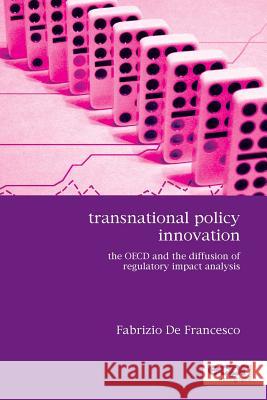Transnational Policy Innovation: The OECD and the Diffusion of Regulatory Impact Analysis » książka
Transnational Policy Innovation: The OECD and the Diffusion of Regulatory Impact Analysis
ISBN-13: 9781907301254 / Angielski / Miękka / 2013 / 224 str.
This book analyses the role of the OECD in diffusing policy innovations. Through the study of regulatory impact analysis (RIA), it shows how transnational networks affect national policy process. De Francesco's analytical framework encompasses the institutional features as well as internal and international determinants of a policy innovation such as RIA. Drawing on original data sets, three empirical analyses assess to what extent government decisions to adopt, implement, and evaluate RIA were driven by the OECD. Transnational Policy Innovation argues that concepts of policy innovation diffusion provide a useful framework for understanding the dynamics of transnational governance. It shows that the OECD has been successful in framing and diffusing a template of evidence-based decision making. However, downplaying RIA as an instrument of political control has limited the influence of the OECD's peer review and comparative indicators on the administrative and institutional setting.
What role does the Organisation for Economic Co-Operation and Development play in diffusing policy innovations? Through regulatory impact analysis (RIA), this book shows how transnational networks, including the OECD, have an impact on national policy process. De Francescos analytical framework encompasses institutional features, as well as internal and international determinants, of the policy innovation RIA. Drawing on original data sets, the author uses three empirical analyses to assess how far the OECD drives government decisions to adopt, implement and evaluate RIA. Fabrizio De Francesco examines the factors that have encouraged and inhibited the spread of regulatory impact analysis among nations. Relying on a sophisticated grasp of theory and an innovative use of different methodologies, his book makes a substantial contribution to the literatures on policy diffusion and comparative regulation.William F. West, Professor and Sara Lindsey Chair, Texas A&M UniversityFabrizio De Francesco offers an insightful quantitative assessment of this spread and its causes; he finds that transnational networks of information sharing, here notably via the OECD, have had a major impact. This book raises the bar for careful empirical studies of regulation, RIA, and the diffusion of policy innovations.Jonathan B. Wiener, William R. and Thomas L. Perkins Professor of Law,Duke University Duke UniversityAs scholars, we have long suspected that the OECD plays a critically important role in diffusing national policy innovations, but we have struggled to explain when, how and indeed why this might be the case. Drawing on a sophisticated mixed methods approach, this important new book seeks to shed new light on the OECDs activities, focusing on the policy tool of impact assessment. I predict it will change the way in which scholars of international organisations and national public administration think about this most mundane but quietly influential of international actors.Andrew Jordan, Professor of Environmental Sciences, University of East AngliaFabrizio De Francesco puts forward a compelling and nuanced analysis of the influence of the OECD on national regulatory policies. The Diffusion of Regulatory Impact Analysis shows clearly the power of the OECD in shaping national agendas - but also its limits. This book belongs on the shelves of all serious scholars of regulatory governance.Fabrizio Gilardi, Professor of Policy Analysis, University of Zurich











